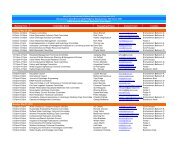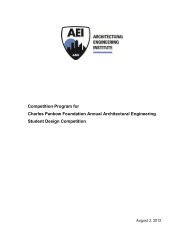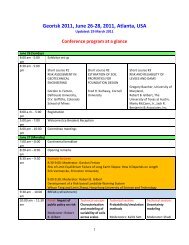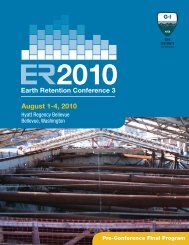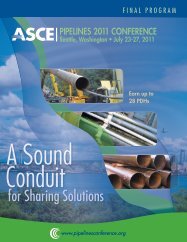to download the PDF of the - American Society of Civil Engineers
to download the PDF of the - American Society of Civil Engineers
to download the PDF of the - American Society of Civil Engineers
Create successful ePaper yourself
Turn your PDF publications into a flip-book with our unique Google optimized e-Paper software.
8<br />
SHORT COURSES<br />
MONDAY, MAY 14 • 8:30 AM - 5:30 pM<br />
Treatment <strong>of</strong> Uncertainty in<br />
Water resource Modeling<br />
PRESENTER: Srikanta Mishra, Ph.D., Senior Engineer and<br />
Project Manager, Intera Inc., Austin, TX, and Adjunct Pr<strong>of</strong>essor<br />
at <strong>the</strong> University <strong>of</strong> Texas at Austin<br />
Scientists and engineers dealing with water resources are <strong>of</strong>ten<br />
confronted with uncertainty caused by incomplete knowledge<br />
and/or natural randomness. Traditional deterministic modeling<br />
<strong>of</strong> uncertainty in water resource models may involve <strong>the</strong> use <strong>of</strong><br />
best-guess or worst-case assumptions about model inputs <strong>to</strong><br />
quantify <strong>the</strong>ir impacts on model predictions. Alternatively,<br />
a set <strong>of</strong> optimistic and pessimistic values is sometimes utilized<br />
<strong>to</strong> provide upside and downside forecasts around a reference<br />
scenario.<br />
Recently, <strong>the</strong>re has been greater interest in <strong>the</strong> use <strong>of</strong> probabilistic<br />
uncertainty analysis methods, which allow a better definition<br />
<strong>of</strong> <strong>the</strong> range <strong>of</strong> likely outcomes and <strong>the</strong> likelihood <strong>of</strong> each<br />
outcome. This workshop will provide an introduction <strong>to</strong> several<br />
such methodologies including Monte Carlo simulation, analytical<br />
error propagation techniques, and probability/logic tree<br />
analysis method.<br />
Fee, Member ASCE/EWRI/Coop Org: $195 by December 31;<br />
$245 by March 31; and $295 <strong>the</strong>reafter and onsite; Non-Member:<br />
$225 by December 31; $275 by March 31; and $325 <strong>the</strong>reafter and<br />
onsite. This fee includes lunch, refreshment breaks, and all course<br />
materials.<br />
MONDAY, MAY 14 • 8:30 AM - 5:30 pM<br />
Curve Number rainfall-run<strong>of</strong>f:<br />
pr<strong>of</strong>essional applications<br />
PRESENTER: Richard H. Hawkins, Pr<strong>of</strong>essor <strong>of</strong> Watershed<br />
Resources, University <strong>of</strong> Arizona, and Donald E. Woodward,<br />
Natural Resources Conservation Service (retired)<br />
The Curve Number Method is widely used in applied hydrology<br />
and environmental impact analysis. Because <strong>of</strong> its authority,<br />
unique technological niche, and transparency, it is <strong>the</strong> premier<br />
technique for converting event rainfall in<strong>to</strong> direct run<strong>of</strong>f. It<br />
finds wide application in rainfall response for ungaged watersheds,<br />
and as a process component in continuous models. It<br />
is, however, incompletely unders<strong>to</strong>od, <strong>of</strong>ten misused, or misapplied,<br />
and realizations for applications and developments<br />
beyond <strong>the</strong> original handbook are not generally appreciated.<br />
This short course will provide an open factual background on<br />
<strong>the</strong> Curve Number Method: origins and assumption, limits <strong>of</strong><br />
applications, and recent findings, leading <strong>to</strong> more informed<br />
pr<strong>of</strong>essional application <strong>of</strong> <strong>the</strong> method. Its role in understanding<br />
general rainfall-run<strong>of</strong>f hydrology will be explored and<br />
discussed. The workshop includes active, open discussion with<br />
peers and <strong>the</strong> presenters.<br />
Fee, Member ASCE/EWRI/Coop Org: $195 by December 31;<br />
$245 by March 31; and $295 <strong>the</strong>reafter and onsite; Non-Member:<br />
$225 by December 31; $275 by March 31; and $325 <strong>the</strong>reafter and<br />
onsite. This fee includes lunch, refreshment breaks, and all course<br />
materials.<br />
MONDAY, MAY 14 • 9:00 AM - 5:00 pM<br />
& WEDNESDAY, MAY 16 • 9:00 AM - 12:30 pM<br />
CpesC Training & exam<br />
To be eligible <strong>to</strong> register for this course, you must be<br />
registered for <strong>the</strong> Congress.<br />
The National Pollutant Discharge Elimination System<br />
(NPDES) program mandates local s<strong>to</strong>rm water management<br />
programs for thousands <strong>of</strong> municipalities throughout<br />
<strong>the</strong> United States. It also requires that contrac<strong>to</strong>rs<br />
moni<strong>to</strong>r and control s<strong>to</strong>rm ater run<strong>of</strong>f for many projects.<br />
Because <strong>of</strong> <strong>the</strong>se requirements, <strong>the</strong> need for certified<br />
pr<strong>of</strong>essionals in erosion and sediment control continues<br />
<strong>to</strong> grow rapidly. A Certified Pr<strong>of</strong>essional in Erosion and<br />
Sediment Control (CPESC) is a recognized specialist in<br />
soil erosion and sediment control. The CPESC designation<br />
recognizes and certifies pr<strong>of</strong>essionals who can be utilized<br />
<strong>to</strong> design and evaluate erosion and sediment control and/<br />
or s<strong>to</strong>rm water control plans, influence public policy and<br />
land-use planning decisions, and educate o<strong>the</strong>rs in sound<br />
approaches for preventing <strong>of</strong>f-site impacts from development<br />
activities.<br />
This Monday short course will provide study material<br />
for <strong>the</strong> CPESC exam, leading <strong>to</strong> a five-hour test on<br />
Wednesday. Upon successful completion <strong>of</strong> <strong>the</strong> application<br />
process and <strong>the</strong> course, and attainment <strong>of</strong> a passing<br />
grade on <strong>the</strong> exam, pr<strong>of</strong>essionals will be eligible for <strong>the</strong><br />
CPESC designation. The certification program, sponsored<br />
by <strong>the</strong> Soil and Water Conservation <strong>Society</strong> and <strong>the</strong><br />
International Erosion Control Association, in cooperation<br />
with <strong>the</strong> <strong>American</strong> <strong>Society</strong> <strong>of</strong> Agronomy, provides <strong>the</strong><br />
public with evidence <strong>of</strong> pr<strong>of</strong>essional qualifications.<br />
Fee, Member ASCE/EWRI/Coop Org: $195 by December 31;<br />
$245 by March 31; and $295 <strong>the</strong>reafter and onsite; Non-Member:<br />
$225 by December 31; $275 by March 31; and $325 <strong>the</strong>reafter and<br />
onsite. This fee includes lunch, refreshment breaks, exam administration,<br />
and all course materials. Register for this course by fax<br />
or email only.



